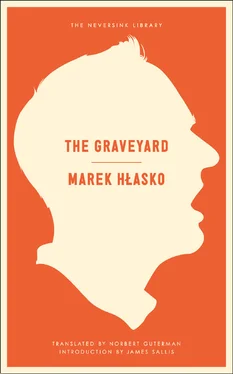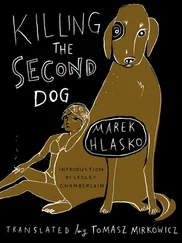“Come here, Blizniaczek,” the First Secretary said cordially, and his heavy hand performed a circular motion. “Come closer; what the hell, sit down …” He pushed a chair over to the boy and gave him a friendly look. “What’s the matter? Do they teach you to behave like a little girl in the Young Communist League, or what? Sit down; speak up, openly, like one of us, a workingman …”
The Young Communist Blizniaczek sat down. He glanced quickly at Franciszek, then stared at the tips of his shoes with great concentration. There was a long silence. Behind the walls the grinding machines hummed monotonously, like telegraph wires, a single protracted note.
“What is it, damn it?” the secretary asked at last. He smacked the table with the flat of his hand. “Are you going to open your mouth, or aren’t you?”
“I’d like to talk to you privately,” Blizniaczek stammered out.
The secretary shook his head. “This is an old comrade,” he said solemnly. “You can say anything in his presence.”
Blizniaczek looked at Franciszek with his blue eyes, shook his unruly hair, and said distinctly: “I want to report that Baniewicz and Majewska … well … you know what.”
The secretary froze. A quick shudder passed over his face. He bent forward. “It’s not true,” he said hoarsely.
“It is.”
The secretary banged his fist on the table so that everything shook. “Impossible.”
Blizniaczek looked up at him with his clear blue eyes. “I am sure of it.”
“How do you know?”
“I saw them.”
“But … Majewska has a husband and child.”
Blizniaczek smiled triumphantly: “That’s just it,” he said. “That’s just it.”
“You saw them?”
“Yes. They have no apartment, that’s why … Yesterday, after work, in the warehouse — I saw it with my own eyes.”
“Did they say anything?”
“Yes. I mean, Majewska told Baniewicz that she didn’t love her husband but couldn’t divorce him because he had a bad case of TB, and that someone has to look after him. And Baniewicz said that he had no apartment. And he said he didn’t like the whole situation.”
“So he doesn’t like it?” To Franciszek the secretary’s voice sounded like an echo.
“No.”
The secretary rubbed his balding head and licked his lips. He had slumped forward; he looked like a man robbed of his most sacred belief. “A thing like that,” he said, and his ringing bass sounded like an old man’s whisper. “In the warehouse, after work … And what did you do after work, Blizniaczek?”
“I conducted an informal talk,” he said. “The subject was ‘Love in the Life of the Soviet Man.’ I was substituting for Plaskota; he substituted for me the other day, and he talked on ‘The Forest in the Life of the Young Communist.’ ”
“In the warehouse, after work,” the secretary repeated, not believing his own ears. “Baniewicz, our comrade …” Once again he banged his fist on the table. Franciszek and Blizniaczek jumped up. “Here, on factory grounds!” he roared. He jumped up from behind his desk, and rushed around to Blizniaczek, holding out his hand. “Thank you in the name of the organization,” he said, shaking his hand vigorously. “Poland will never forget what you’ve done for her. Goodbye.”
Blizniaczek rose and walked in measured steps to the door. There he stopped for a moment, raising his left fist. “Where have I seen this before?” Franciszek thought suddenly. “Where have I seen it?”
Blizniaczek closed the door behind him, and walked down the corridor, his heels tapping. The secretary sat motionless for a while, his eyes vacant, unseeing. Then he turned to Franciszek; he remained silent. At last his eyes brightened again. “You see,” he said in a tired voice, “here I sit behind my desk; everything seems to be all right; but wherever you look — the enemy is vigilant …” He drummed on the glass plate with his clumsy fingers. “We must be vigilant,” he said. “We must be constantly on our guard, Franciszek. Our people are inexperienced: they deviate; they succumb to whispering campaigns; it’s easy to break them down … Take Baniewicz. We sent him to the miners as an agitator — he did a good job. We sent him as our delegate to the scrap-collection campaign — he did well there too. He was top man in the clean-up Warsaw campaign; he even got a certificate. In our amateur theatricals he works like a fiend: he dances, sings, acts — some even say he has a good deal of talent. To look at him you’d say he was pure gold. And now, all of a sudden — plop!”
Once again he buried his face in his hands. His mouth drooped pitiably. “I shouldn’t bother him at such a moment,” Franciszek thought. But he swallowed hard, and said: “Listen, I’m late for work — I was out all morning. What I want to tell you won’t take five minutes. Yesterday, as I was going home from the meeting, I met an old friend of mine from the underground, a wonderful fellow. He was deputy commander of our unit; now he’s executive manager of a big construction project in the provinces somewhere.” He paused, and sighed heavily. “That’s all it was — an unexpected meeting, two old friends … We went to a bar to talk about old times, and — there’s no point hiding it — I drank a bit. Then we separated—”
Someone knocked at the door, and Franciszek stopped.
“Come in,” said the secretary.
The door opened slightly; a man looked in, and, seeing that the secretary was not alone, was about to withdraw, but the secretary repeated, “Come in, come in.”
A short man with a splendid shock of gray hair and nervous hands entered the room.
“I’m listening, Citizen Jarzebowski,” the secretary said. “Make yourself at home, sit down.”
The newcomer sat down, folding his nervous hands on his knees. His hair shone in the artificial light of the bulb.
“Well, what’s on your mind, Citizen Jarzebowski?” the secretary asked. He glanced at Franciszek and tapped his forehead with his hand. “But of course you don’t know each other, that’s true. Our new head bookkeeper, Citizen Jarzebowski; Comrade Kowalski, assistant technical director. Citizen Jarzebowski is new here,” he explained to Franciszek. “He’s a nonparty activist. He is going to conduct a glee club as part of our social program.”
“Yes, yes,” Jarzebowski said eagerly, smiling at Franciszek. “Perhaps you’d like to join us?”
“What?”
“Would you do us the favor of joining our club and singing with us?”
“Me?” asked Franciszek, surprised.
“Why of course, what’s so strange about that?” Jarzebowski said in a slightly offended tone. “What part would you like to sing? Baritone? Tenor? I suppose a baritone; you don’t look like a bass — no offense meant. We’re having our first rehearsal today after work — we’re going to sing ‘The March of the Enthusiasts.’ How does it strike you?”
“I might at that if I can fit it in,” Franciszek stammered.
Jarzebowski inclined his gray head with dignity. “I shall await your kind answer,” he said.
The secretary said: “Well, what’s on your mind, Citizen Jarzebowski? Speak up, come to the point; talk like one of us, a workingman.”
“My dear sir,” Jarzebowski stammered, turning red with pleasure, “this is a great honor — I mean, your kind expression, ‘like one of us’—but you see, my dear sir,” here he lowered his eyes with embarrassment, “unfortunately I am not with you because of my convictions; but, if I may say so, you will be good enough to understand, I hope — I am — I was — a landowner. I mean I have been a progressive since I was a boy, rather Left Wing, but …” He spread his arms in a magnificent gesture.
Читать дальше






![Ричард Деминг - Whistle Past the Graveyard [= Give the Girl a Gun]](/books/412176/richard-deming-whistle-past-the-graveyard-give-t-thumb.webp)


